A board of trustees is a governing body responsible for overseeing the operations, strategic direction, and financial stability of nonprofit organizations. Comprised of individuals who are passionate about the organization's mission, the board of trustees provides guidance and decision-making to ensure the organization's success. Trustees have fiduciary duties, including setting policies, approving budgets, and hiring key staff members. They must ensure legal and ethical compliance, maintain transparency, and promote the organization's best interests. The board of trustees plays a crucial role in governance, accountability, and sustainability, working closely with stakeholders and actively contributing to the organization's growth and impact. The size and structure of a board can vary depending on the organization's needs, but typically, it comprises individuals with diverse backgrounds and expertise. Boards can range from a few members to dozens, with a balance of skills and perspectives for effective decision-making. A nominating committee is responsible for identifying and recruiting potential board members, ensuring a diverse and skilled board composition. They evaluate candidates based on their experience, commitment, and alignment with the organization's mission. Board members can be elected by the organization's membership or appointed by existing board members. The process should be transparent and promote the engagement of the organization's stakeholders. Term limits help ensure that board membership remains dynamic and prevents stagnation. Rotating terms can facilitate the onboarding of fresh perspectives, skills, and ideas while maintaining organizational continuity. A diverse and inclusive board better reflects the community it serves and enables more effective decision-making. Boards should actively seek members from different backgrounds, experiences, and perspectives to ensure a well-rounded and representative governing body. Board members must exercise due diligence and reasonable care when making decisions on behalf of the organization. This includes reviewing relevant information, asking questions, and seeking expert advice when necessary. Trustees are expected to prioritize the organization's interests above their own, avoiding conflicts of interest and acting in the best interest of the organization at all times. Board members must ensure that the organization operates within the bounds of its mission, adheres to applicable laws, and follows established policies and procedures. Trustees are responsible for guiding the organization's strategic direction, setting goals, and monitoring progress. They must ensure that the organization remains mission-driven and responsive to the evolving needs of its stakeholders. Board members must ensure the organization's financial stability by approving budgets, monitoring financial performance, and ensuring proper financial controls are in place. They must also safeguard the organization's assets and resources. Trustees are responsible for developing, reviewing, and updating policies to guide the organization's operations and decision-making. They must ensure that policies align with the organization's mission and comply with relevant laws and regulations. The board is responsible for hiring, supervising, and evaluating the performance of the CEO or executive director. They must provide guidance, support, and feedback to ensure the organization's success. Board members should regularly assess their performance and identify areas for improvement. This process includes ongoing education, training, and development to enhance the board's effectiveness and adapt to changing circumstances. Standing committees are permanent committees that focus on specific areas of responsibility within the organization, such as finance, governance, or fundraising. They meet regularly to address ongoing issues, develop policies and strategies, and provide oversight and guidance in their respective areas of expertise. Ad hoc committees are temporary committees formed to address specific issues or projects. They are disbanded once their purpose is fulfilled, allowing for flexibility and adaptability in the board's structure. The executive committee is composed of the board's officers and typically handles urgent matters between board meetings. They have the authority to make decisions on behalf of the full board when necessary but must report their actions at the next board meeting. The finance committee oversees the organization's financial management, including budgeting, financial reporting, and investment strategies. They ensure the organization operates within its means and maintains long-term financial stability. The governance/nominating committee focuses on board composition, recruitment, and succession planning. They identify potential board members, evaluate their skills and commitment, and ensure a diverse and representative board. The audit committee is responsible for overseeing the organization's internal controls, risk management, and compliance with laws and regulations. They liaise with external auditors, review audit reports, and make recommendations to the board. The fundraising/development committee leads the organization's fundraising efforts, including identifying potential donors, planning events, and developing strategies to secure funding. They ensure that the organization has the necessary resources to fulfill its mission. Task forces and special projects are temporary groups established to address specific issues or initiatives. They allow the board to focus on particular areas of concern, engage external expertise, and adapt to emerging challenges. A well-planned meeting schedule and agenda ensure that board members can efficiently address pressing issues and make informed decisions. Agendas should prioritize strategic discussions, provide time for deliberation, and encourage active participation. Board members should receive relevant materials in advance of meetings, allowing them to review information and prepare questions. This ensures that meetings are productive, focused, and that decisions are based on a thorough understanding of the issues at hand. An effective decision-making process encourages open dialogue, constructive debate, and consensus-building. Board members should feel empowered to express their opinions and contribute to decisions that align with the organization's mission and values. Efficient meeting facilitation and time management ensure that the board can address important issues while maintaining momentum and focus. The board chair should guide discussions, encourage participation, and balance the need for thorough deliberation with the need for timely decisions. Open communication between board members, staff, and stakeholders is essential for effective governance. Regular updates, open channels for feedback, and opportunities for collaboration promote transparency and build trust within the organization. Boards must ensure that the organization complies with applicable laws and regulations, including those related to financial reporting, employment, and charitable activities. Regular reviews and updates to policies and procedures help maintain compliance and mitigate risk. Boards should have clear conflict of interest policies in place to guide decision-making and ensure the organization's interests are prioritized. Board members must disclose potential conflicts and recuse themselves from decisions where their personal interests may be at stake. Effective risk management involves identifying, assessing, and addressing potential risks that could impact the organization. Boards must ensure that appropriate measures are in place to mitigate risks and protect the organization's assets, reputation, and stakeholders. Boards must demonstrate transparency and accountability to maintain the trust and confidence of their stakeholders. This includes open communication, regular reporting on the organization's activities and finances, and adherence to ethical standards and best practices. Board members should actively participate in fundraising efforts, contributing financially to the organization and leveraging their networks to secure additional support. Their personal commitment demonstrates a strong belief in the organization's mission and encourages others to contribute. An effective board identifies potential donors, cultivates relationships, and secures financial support to ensure the organization's sustainability. This involves understanding donor motivations, sharing the organization's impact, and recognizing donor contributions. Boards play a critical role in planning and executing fundraising events and campaigns. Their involvement ensures that events align with the organization's mission, reach target audiences, and generate the necessary resources to support programs and operations. Board members can contribute to grant writing and cultivating relationships with foundations and other funding sources. Their expertise and connections can help secure grants, sponsorships, and other funding opportunities to support the organization's work. Effective succession planning involves identifying potential future board leaders and preparing them to assume key roles. This ensures a smooth transition of leadership and maintains organizational continuity and stability. New board members should receive a comprehensive orientation and onboarding process to familiarize them with the organization, its mission, and their roles and responsibilities. This helps ensure that they can contribute effectively from the start of their tenure. Mentorship and knowledge transfer between experienced and new board members facilitate the sharing of insights, skills, and institutional knowledge. This helps maintain the organization's strategic direction and ensures that new members can contribute effectively. Recognizing and appreciating board members for their contributions and dedication is essential for maintaining morale and motivation. Celebrating successes, acknowledging milestones, and providing feedback fosters a positive board culture and encourages ongoing commitment. Boards must remain adaptable and responsive to changes in the external environment, including shifting societal needs, technological advancements, and evolving regulatory landscapes. This requires ongoing learning, innovation, and strategic thinking. Boards may face challenging decisions and conflicts that require careful deliberation, negotiation, and diplomacy. Effective communication, mutual respect, and a focus on the organization's mission can help navigate these difficult situations. Technological advancements offer new opportunities and challenges for boards. Embracing technology can enhance communication, streamline operations, and improve decision-making, but also requires ongoing learning and adaptation. Effective boards engage with their community and stakeholders to understand their needs, expectations, and perspectives. This promotes a collaborative approach, strengthens relationships, and ensures that the organization remains relevant and impactful. A board of trustees plays a vital role in the governance of nonprofit organizations. Trustees are responsible for overall management, strategic planning, and financial stability. Boards should be composed of individuals with diverse backgrounds and expertise, selected through a transparent process. Trustees have fiduciary duties, must adhere to legal and ethical obligations, and ensure compliance with regulations. Effective board meetings, communication, and committees enhance governance. Boards should prioritize transparency, accountability, and risk management. Fundraising and donor cultivation are essential, with board members expected to contribute financially and leverage their networks. Succession planning, orientation, and mentorship ensure continuity and development. Boards face challenges such as adapting to changing environments, navigating conflicts, embracing technology, and engaging with stakeholders. By addressing these challenges and embracing opportunities, boards of trustees can guide organizations toward fulfilling their missions and making a positive impact.What Is a Board of Trustees?
Composition of a Board of Trustees
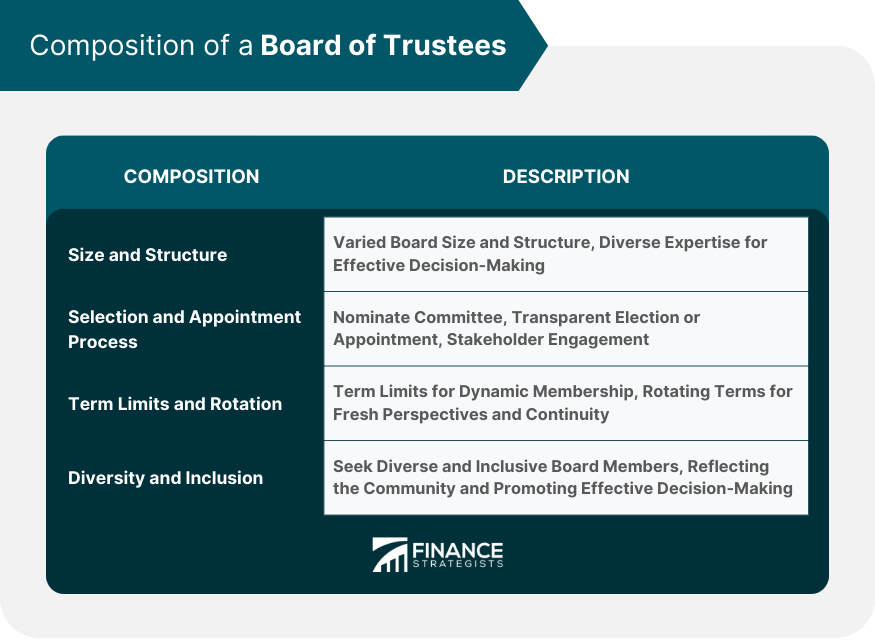
Size and Structure
Selection and Appointment Process
Nominating Committee
Election or Appointment
Term Limits and Rotation
Diversity and Inclusion
Roles and Responsibilities of Board Members
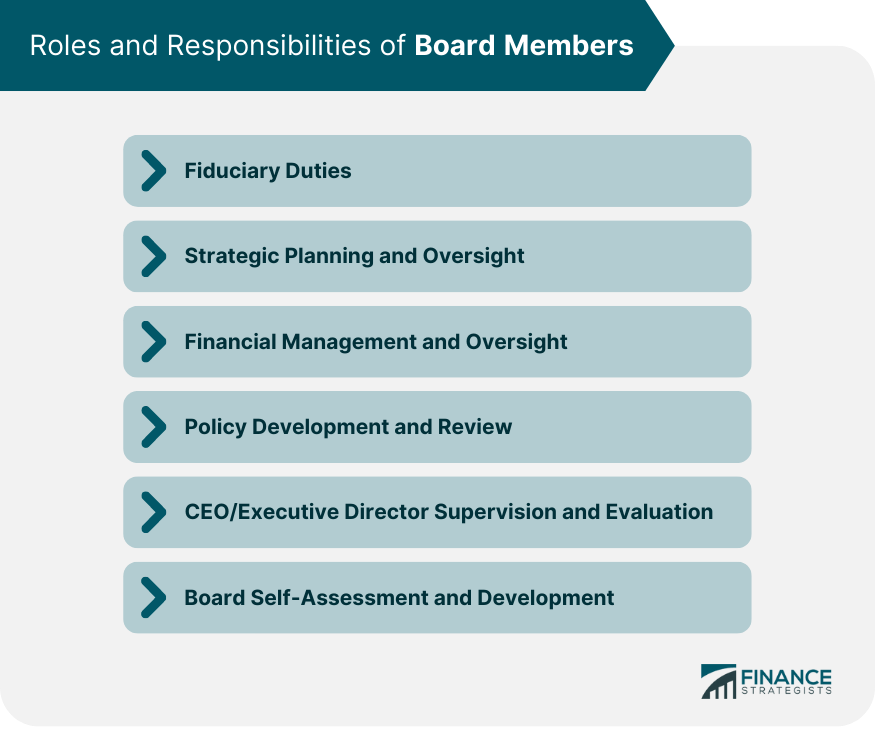
Fiduciary Duties
Duty of Care
Duty of Loyalty
Duty of Obedience
Strategic Planning and Oversight
Financial Management and Oversight
Policy Development and Review
CEO/Executive Director Supervision and Evaluation
Board Self-Assessment and Development
Board Committees and Task Forces
Types of Committees
Standing Committees
Ad Hoc Committees
Common Board Committees
Executive Committee
Finance Committee
Governance/Nominating Committee
Audit Committee
Fundraising/Development Committee
Task Forces and Special Projects
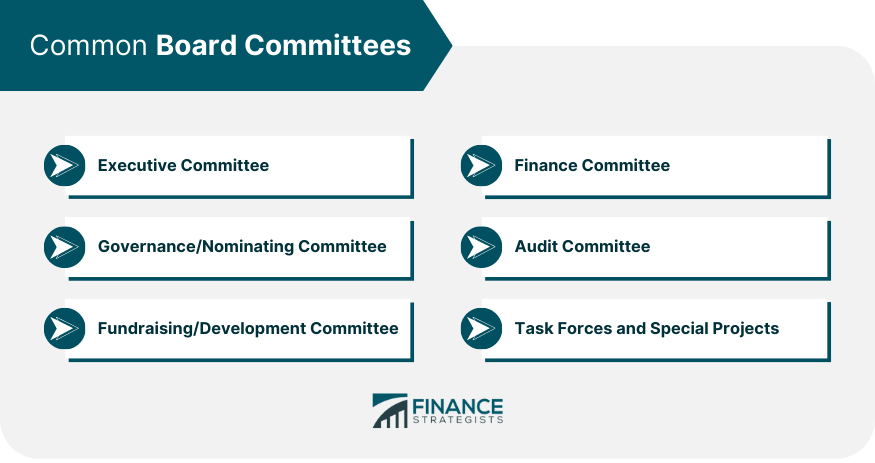
Effective Board Meetings and Communication
Scheduling and Agenda Development
Meeting Preparation and Materials
Decision-Making Process
Meeting Facilitation and Time Management
Maintaining Open Lines of Communication
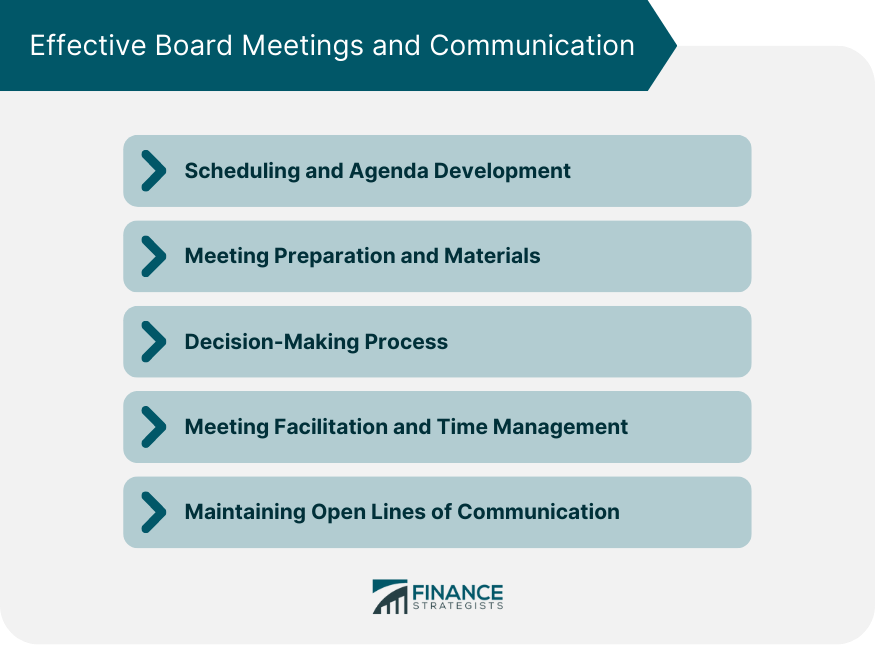
Board Governance and Legal Compliance
Ensuring Compliance with Laws and Regulations
Conflict of Interest Policies
Risk Management and Liability
Transparency and Accountability
Board of Trustees and Fundraising
Board Member Giving Expectations
Identifying and Cultivating Donors
Fundraising Events and Campaigns
Grant Writing and Foundation Relations
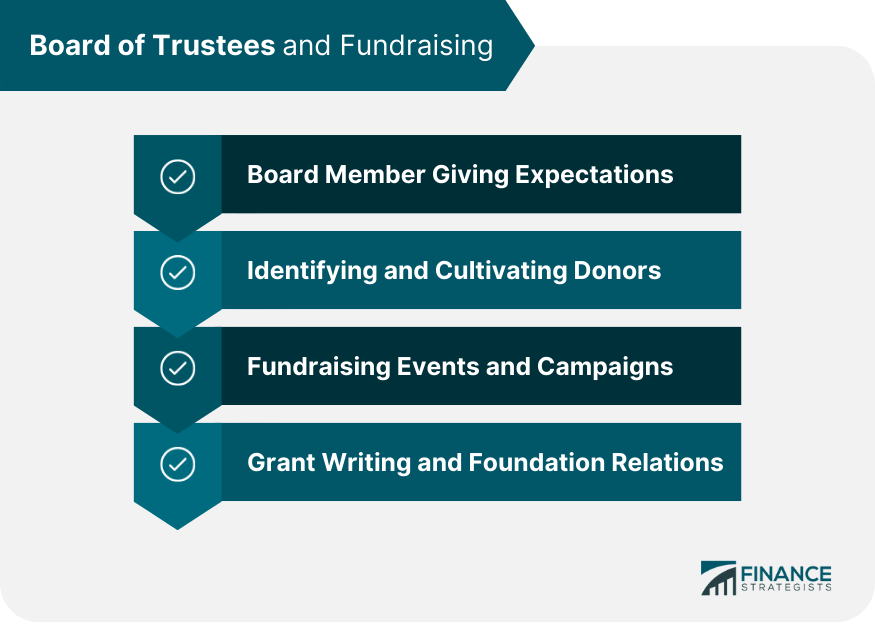
Succession Planning and Board Transitions
Identifying Future Leaders
Board Member Orientation and Onboarding
Mentorship and Knowledge Transfer
Board Member Recognition and Appreciation
Challenges and Opportunities for Boards of Trustees
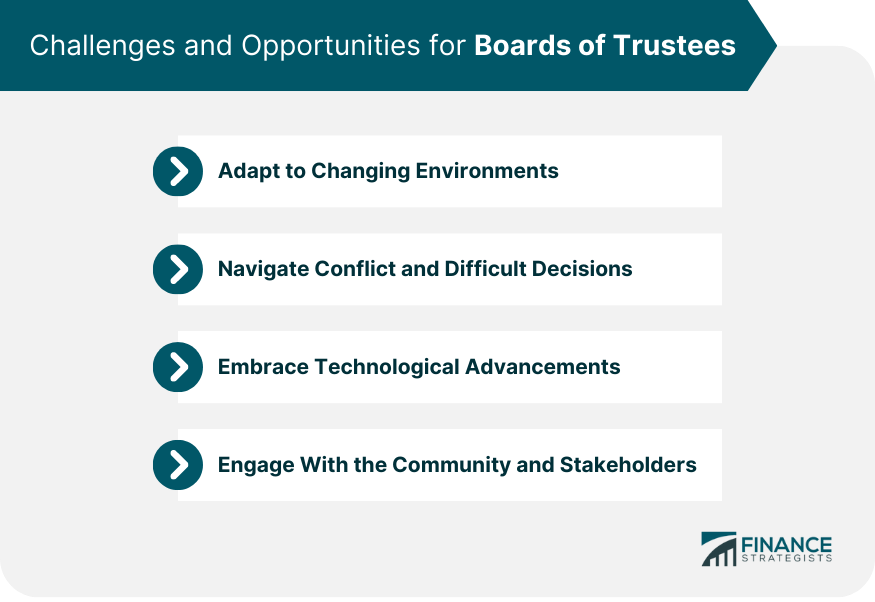
Adapting to Changing Environments
Navigating Conflict and Difficult Decisions
Embracing Technological Advancements
Engaging With the Community and Stakeholders
Final Thoughts
Board of Trustees FAQs
A board of trustees serves as the governing body of a nonprofit organization, responsible for overseeing the overall management, strategic planning, and financial stability. They ensure the organization fulfills its mission, operates ethically, and adheres to legal and regulatory requirements.
Members of a board of trustees are typically selected through a nomination process led by a governance or nominating committee. This committee identifies potential candidates based on their experience, commitment, and alignment with the organization's mission. Board members are then either elected by the organization's membership or appointed by existing board members.
The fiduciary duties of a board of trustees include the duty of care, duty of loyalty, and duty of obedience. Board members must exercise due diligence, act in the best interest of the organization, and ensure compliance with laws, regulations, and the organization's mission.
A board of trustees can promote diversity and inclusion by actively seeking members from different backgrounds, experiences, and perspectives. This ensures a well-rounded and representative governing body that better reflects the community it serves and enables more effective decision-making.
A board of trustees is responsible for overseeing the organization's financial management, including approving budgets, monitoring financial performance, and ensuring proper financial controls. In terms of fundraising, board members are expected to contribute financially, identify and cultivate donors, and participate in fundraising events and campaigns to secure the necessary resources for the organization.
True Tamplin is a published author, public speaker, CEO of UpDigital, and founder of Finance Strategists.
True is a Certified Educator in Personal Finance (CEPF®), author of The Handy Financial Ratios Guide, a member of the Society for Advancing Business Editing and Writing, contributes to his financial education site, Finance Strategists, and has spoken to various financial communities such as the CFA Institute, as well as university students like his Alma mater, Biola University, where he received a bachelor of science in business and data analytics.
To learn more about True, visit his personal website or view his author profiles on Amazon, Nasdaq and Forbes.











